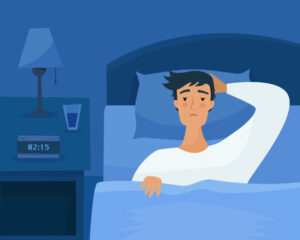Do you have trouble sleeping at night? You’re not alone. Millions of adults around the world have trouble getting a good night’s sleep. Sleep issues can affect your overall health, safety, and quality of life. It can further affect your ability to drive safely and increase your risk of other health problems. In this blog post, we will discuss the different types of sleep issues that adults can experience, symptoms, and causes and we will provide some tips on how to get a better night’s sleep.
Contents
What Are Sleeping Issues?
Sleep Issues are conditions that lead to changes in the way you sleep. Sleep disturbances can affect overall health, safety, and quality of life. Lack increases your risk of developing other health problems and thus degrading the value of life.
Sleeping Issues In Adults
Millions of adults around the world have trouble getting a good night’s sleep. Some of the signs and symptoms of sleep issues in adults include excessive sleepiness during the day, irregular breathing, or increased movement during sleep. Other signs and symptoms include irregular sleep and wakefulness and difficulty falling asleep.
Types Of Sleeping Issues
There are many different types of sleep disorders, and each one has its own set of symptoms. Some common sleep disorders include:
Insomnia
This is the most common type of sleep issue in adults, and it can be caused by stress, anxiety, depression, or other medical conditions. People with insomnia have trouble falling asleep or staying asleep.
Sleep Apnea
This is a serious sleep disorder that occurs when you stop breathing for short periods during sleep. Sleep Apnea can cause high blood pressure, heart disease, and other health problems.
Restless Leg Syndrome (RLS)
This is a condition that causes an irresistible urge to move your legs. It can cause pain and difficulty sleeping. It usually happens due to discomfort while sitting or lying down.
Narcolepsy
This is a sleep issue in adults that causes people to fall asleep suddenly and unexpectedly during the day. The person is affected by excessive daytime sleepiness and sudden attacks of sleep which often make it difficult to stay awake for long periods, no matter the circumstances.
Symptoms
Some of the symptoms of sleep issues in adults include:
- difficulty falling asleep
- waking up frequently during the night
- feeling tired during the day
- moodiness or irritability
- falling asleep at the wheel
- difficult to stay awake when you are inactive, like watching or reading TV
- finding difficult to watch or focus on work, school, or home
- problems at work or school
- memory problems
- slow responses
- emotional instability
If you have any of these symptoms, you may have a sleep disorder. If an adult thinks he might have a sleep issue, it is important to speak with his doctor. A doctor can help you find the cause of your sleep problem and suggest ways to treat it. If you are experiencing any of these symptoms, they may be indicative of a sleep disorder. Don’t wait and let it grow further unless it is something you feel like you can manage on your own.
Causes
There exist different types of causes if adults are suffering from sleeping issues. Various types of causes are explained below.
Common causes
 Work Pressure: Worries about work, school, health, finances, or family can come up at night and interfere with sleep. Stressful life events or trauma, such as the death or illness of a loved one, divorce, or job loss, can also lead to insomnia.
Work Pressure: Worries about work, school, health, finances, or family can come up at night and interfere with sleep. Stressful life events or trauma, such as the death or illness of a loved one, divorce, or job loss, can also lead to insomnia.- Travel Or Working Hours: Circadian rhythms act as an internal clock and control things like the sleep-wake cycle, metabolism, and body temperature. Disruption of the body’s circadian rhythm can lead to insomnia. Reasons include traveling across multiple time zones, working late or early shifts, and jet lag due to frequent shift changes.
- Bad Sleep Habits: Bad sleep habits include irregular sleeping times, stimulating activities before bed, uncomfortable sleeping environments, and using the bed for work, eating, or watching TV. Computers, TVs, video games, smartphones, or other screens can interfere with your sleep cycle before bed.
- Eating Very Late At Night: A light snack before bed is fine, but if you overeat, it can make you feel physically uncomfortable while lying down. Many people also experience heartburn, the return of stomach acid and food into the esophagus after eating, which can keep them awake.
Chronic insomnia can also be related to certain medications.
Medical Causes
- Mental Health Disorders: Anxiety disorders such as post-traumatic stress disorder can interfere with sleep. Waking up too early can be a sign of depression. Insomnia is often associated with other psychiatric disorders.
- Medicines: Many prescription medications can interfere with sleep, such as some antidepressants and medications for asthma or high blood pressure. Many over-the-counter medications, such as some pain relievers, cold and allergy medications, and weight loss products, contain caffeine and other stimulants that can interfere with sleep.
- Sleep Disorders: Due to sleep apnea, breathing regularly stops during the night, interrupting sleep. Restless legs syndrome causes leg discomfort and an almost irresistible urge to move, which can keep you from falling asleep.
- Caffeine, Nicotine, and Alcohol: Coffee, tea, cola, and other caffeinated drinks are stimulants. Drinking alcohol later in the day or at night keeps you from awakening at night. The nicotine in tobacco products is another stimulant that interferes with sleep.
Insomnia/ sleep issues in adults become more common with age. As you get older, you may experience more issues with quality sleep.
Age-Related Causes
- Changes In Sleep Patterns: As you get older, sleep often becomes less relaxing, so noise or other changes in your environment are more likely to wake you up. As you get older, your internal clock usually advances, so you get tired earlier at night and wake up earlier in the morning. But older people generally need the same amount of sleep as younger people.
- Activity Changes: You may be less physically or socially active. Lack of activity can interfere with good sleep. Also, the less active you are, the more likely you are to take naps during the day, which can interfere with sleep at night.
- Health Changes: Chronic pain, such as arthritis or back problems, as well as depression or anxiety, can interfere with sleep. Problems that increase the need to urinate at night, such as prostate or bladder problems, can interfere with sleep. Sleep apnea and restless legs syndrome become more common with age.
- More Drugs: Older people generally take more prescription drugs than younger people, which increases the chance of drug-related insomnia.
Effects
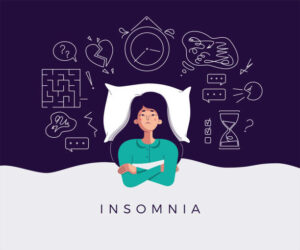 Sleep is an important aspect of health as a healthy diet and regular physical activity. Whatever the cause of the sleep disorder, insomnia can have mental and physical consequences. Adults with sleeping issues report a lower quality of life than those who sleep well. Complications of insomnia can include:
Sleep is an important aspect of health as a healthy diet and regular physical activity. Whatever the cause of the sleep disorder, insomnia can have mental and physical consequences. Adults with sleeping issues report a lower quality of life than those who sleep well. Complications of insomnia can include:
- Poor performance at work or school
- Slower reactions while driving and a higher risk of accidents
- Mental health disorders, such as depression, anxiety disorder, or drug use
- Increased risk and severity of chronic diseases or conditions such as high blood pressure and heart disease.
Diagnosis
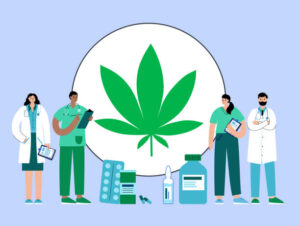 You can diagnose the issue with the help of a suitable doctor first if you are suffering from a sleeping issue. Your doctor will use your medical history, sleep history, and physical exam to make a diagnosis. You can also take a sleep test (polysomnography). The most common types of sleep tests track and record data about your body during a full night’s sleep. The data include:
You can diagnose the issue with the help of a suitable doctor first if you are suffering from a sleeping issue. Your doctor will use your medical history, sleep history, and physical exam to make a diagnosis. You can also take a sleep test (polysomnography). The most common types of sleep tests track and record data about your body during a full night’s sleep. The data include:
- changes in brain waves
- eye movements
- respiration rate
- blood pressure
- heart rate and electrical activity of the heart and other muscles
The doctor may ask a few questions about being diagnosed with a sleep disorder, such as:
- How many hours do you sleep at night?
- Do you sleep well?
- How long do you sleep?
- Do you wake up in the middle of the night?
- Do you work the night shift?
- How do you feel sleeping during the day?
Remedies
There are many natural remedies to cure the Sleep Issue in adults. Adopting a few of such regular practices and executing them in the right manner will surely heal your problem and you will get rid of sleeping problems quickly.
Meditation 
Meditation has the power to cure all mental problems. Adults must try it to cure their sleep issues. Try it for 3 days and you will be hooked. It brings peace of mind to your mind, which leads to a restful night’s sleep. You can meditate before going to bed as you lie in bed and clear all thoughts from your mind.
Types of meditation may include:
- Meditation guides: which help someone else’s voice relax
- Vipassana Meditation: a Buddhist meditation practice
- Yoga Nidra: a form of guided meditation
Massage
Bring a shampoo or massage to soothe your body and relieve constipation or any pain that causes insomnia or sleep issue. Using essential oils and massage is one of the most effective natural remedies for stress!
Aura Of Saplings
One of the best home remedies for insomnia is having plants in the bedroom. Get your green babies and new partners to bed and get ready for a good night’s sleep.
Sweat
Go for a brisk walk or run in the evening. Physical activity encourages sleep because your body is tired and needs to be refreshed. Sweat and watch the changes it makes during sleep.
Warm And Scented Candles
Another good natural solution to clutter is to use warm and scented candles. Light the candles, turn off the lights and the door and try to sleep, while the smell will improve your sleep.
Wash Feet And Apply Oil
Your grandmother may have asked you to do this. But did you follow him? No you did not. Try now. Before going to bed, wash your feet and apply coconut oil or mustard oil to your feet. This will help promote restful sleep!
Turn Off Your Phone
The last one has to be about where you can’t sleep. Turn off your phone and put it away. You will not be able to sleep during the social networking program. So stop it and try to sleep!
Eat Foods That Help You Sleep
What you eat and what you don’t eat can affect your sleep. Limit your use of caffeine, alcohol, and nicotine. Caffeine and nicotine can have a significant effect on sleep. Both can cause confusion and anxiety.
Eat Foods Rich in Magnesium
Some studies show that magnesium supplements can help with depression. Adults suffering from sleep issues should include Manganese-rich foods such as:
- Legumes and seeds
- dark green flowers
- Wheat
- Almond
- blackstrap molasses
- yeast
- Wheat
Include all these foods in your diet. You can also try having green vegetable juices.
Upgrade Your Feng Shui Room
Feng Shui comes from the Chinese philosophy of Taoism. This template provides instructions on how to set up flow control rooms. Try applying feng shui tips to your bedroom. It can reduce the sleeping issue gradually.
Listen to music
Soft, soothing music can also help improve sleep. Music therapy has been found to improve sleep. It can also reduce waking up at night, prolong the sleep, and increase sleep satisfaction.
There are many natural remedies you can try when you are having sleeping issues as an adult. Some have been confirmed in studies. The value of others is mixed or confused. Talk to your doctor before starting any routine treatment. Think of confusion as a “wake-up call.” Make sure you get treatment for a potentially serious illness right away. Your doctor’s conversation guide can help you start that conversation with your doctor.
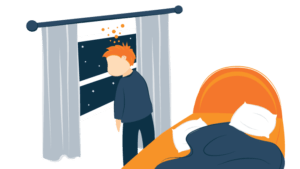
Conclusion
Sleep Issues may not be harmful to some adults, but they affect their life many times indirectly and can seriously harm their mind, weight, education/work, mental health, and general health. Common conditions such as narcolepsy, insomnia, restless legs syndrome, and sleep apnea prevent them from getting the long, deep sleep they need to function properly. If they feel sleepy, they don’t need to hesitate to contact their doctor. Their health and quality of life depend on a good night’s sleep. Practice of good sleep hygiene and following doctor’s instructions will surely help such adults to improve their life once again.
For more information, please contact MantraCare. Sleep is an essential part of our daily routine and it plays a significant role in maintaining a healthy body and mind. If you have any queries regarding Online Insomnia Counseling experienced therapists at MantraCare can help: Book a trial therapy session
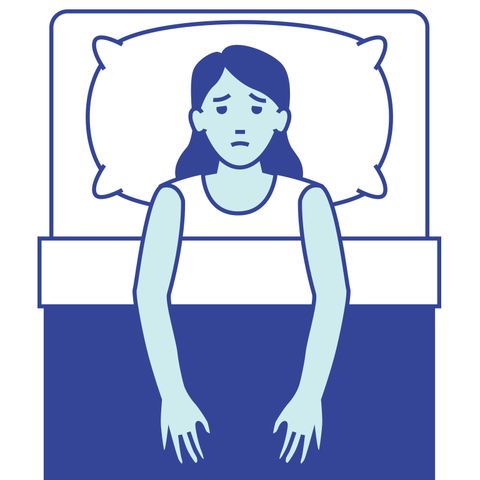
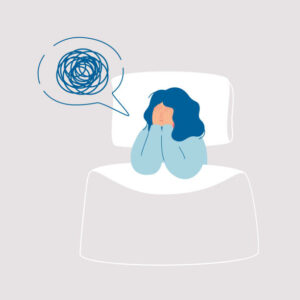
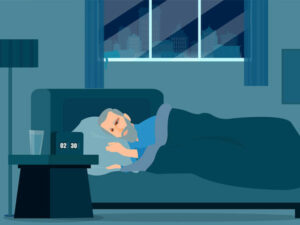 Work Pressure: Worries about work, school, health, finances, or family can come up at night and interfere with sleep. Stressful life events or
Work Pressure: Worries about work, school, health, finances, or family can come up at night and interfere with sleep. Stressful life events or 